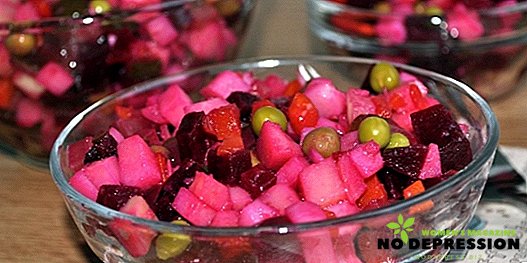The menu of the Japanese diet for 13 days is not particularly similar to the classic cuisine of the Land of the Rising Sun, but it makes it possible to form healthy eating habits characteristic of its population.
Thirteen-day Japanese diet helps to improve metabolism, and this means that weight loss will continue after the release of it. In order to achieve the desired result, you must adhere to the proposed menu, without changing the days and components of the diet.

What is the essence of diet?
Compliance with the Japanese diet for 13 days guarantees weight loss for those who have managed not to break. The most important requirement is limited salt intake. Salt can not be used either in ready-made dishes, or in those that are prepared independently. In addition, it is forbidden to use:
- sweet;
- flour;
- cereals;
- pasta;
- alcoholic beverages.
Such a diet requires strict adherence to all rules. If a violation occurs, the whole cycle will have to be repeated anew.
Do not interchange the days of the diet, meal time, marked products and dishes, as strictly prescribed sequence guarantees a quick and high-quality result, that is, leaving extra pounds.
Main principles
In order to get a good result without disruption and damage to health, you should adhere to the following principles:
- taking vitamins. The diet of the Japanese thirteen-day diet is not particularly diverse, so the reserves of valuable elements in the body must be replenished;
- drinking water. The goal of the diet is to remove excess fluid from the body without dehydration. In the day you need to drink at least two liters of pure water, including one glass of water on an empty stomach in the morning;
- timely preparation for a diet. A week before it is necessary to reduce the caloric intake of food, i.e. refuse fatty, fried, sweet, flour, and so on;
- psychological preparation. You need motivation and a formed ideal to which you should come.
On the pros and cons
The Japanese diet for 13 days has many supporters and opponents, however, they both speak about its effectiveness and that it can lose 8-10 kilograms in a short time.
The following dietary benefits are highlighted:
- quick disposal of excess fluid in the body;
- prevention of diseases of the cardiovascular system;
- reducing the amount of salt consumed;
- protein food, which is the basis of the Japanese diet, can not only lose weight, but also improve health in general.

Now let's talk about the cons:
- imbalance of diet, which can harm the body;
- significant intervals between meals, which is unacceptable for people with diseases of the stomach and intestines;
- low calorie intake of food is not combined with physical activity;
- a large number of contraindications;
- improper exit from the diet will reduce the total to zero;
- repeat the diet more than once every six months, it is impossible.
Thirteen-day Japanese diet is best suited for those people who need to lose 10 or more kilograms. If the goal - the elimination of 2-3 kilograms, it is better to refer to the weekly option.
Are there any contraindications?
The menu is very strict, and before you begin to comply with it, you should definitely consult a specialist. The following people are prohibited from sticking to the diet:
- pregnant and lactating women;
- persons under 18;
- people who are engaged in serious mental or physical work experience a strong emotional load;
- persons suffering from chronic diseases.
Such symptoms can be a sign of severe dehydration and disruptions in the functioning of the body.
Thirteen day diet menu: daily diet
Observing the Japanese thirteen-day diet, you must adhere to this diet, as in the table:
| Day | Diet |
|---|---|
| 1 | In the morning: coffee without sugar. At lunch: two boiled chicken eggs, cabbage salad. You can eat a small tomato or drink a glass of tomato juice. In the evening: steamed fish - about 200 grams, cabbage salad. |
| 2 | In the morning: coffee without sugar, a dry slice of bread made from rye flour. At lunch: 200 grams of boiled fish, cabbage salad. In the evening: 200 grams of boiled beef without salt, a glass of kefir. |
| 3 | In the morning: a piece of dry rye bread and coffee. At lunch: 200 grams of slightly roasted zucchini. In the evening: 2 boiled eggs, 200 grams of boiled veal, cabbage salad. |
| 4 | In the morning: coffee. At lunch: boiled egg, 3 raw or boiled carrots, 20 grams of parmesan. In the evening: two apples, pears or oranges. |
| 5 | In the morning: boiled egg, one grated carrot, dressed with lemon juice. At lunch: 400 grams of boiled fish, a glass of tomato juice. In the evening: two apples, pears or oranges. |
| 6 | In the morning: coffee. At lunch: 400 grams of boiled chicken, carrot-cabbage salad. In the evening: 2 boiled eggs, one carrot grated and seasoned with linseed oil. |
| 7 | In the morning: green tea. At lunch: two apples and 200 grams of boiled veal. In the evening: any of the above dinners (excluding the third day). |
| 8 | Repeat the menu of the sixth day. |
| 9 | In the morning: coffee. At lunch: 400 grams of boiled fish, tomato juice. In the evening: two apples. |
| 10 | Repeat the fourth day menu. |
| 11 | Repeat the menu of the third day. |
| 12 | Repeat the second day menu. |
| 13 | Repeat the first day menu. |
When you first see the menu provided above, you might think that following a thirteen-day diet is practically starvation, but it is not. The body needs some time for restructuring, after which it will begin to eliminate fat reserves, and the caloric content of the consumed food will be enough to fully provide it with energy.

How to get out of the diet without harm to health?
It is best to look for an answer to this question before you go on a diet. This will provide an opportunity to psychologically tune to a specific number of days when it is necessary to limit the use of certain products.
The basic principles of nutrition to consolidate the results obtained after leaving the Japanese diet:
- Gradual exit. Returning to the usual diet should be within two to three weeks.
- Slow replenishment of the menu with new products. During the diet, the stomach has lost the dietary variety, so it cannot fully absorb and digest the resulting substances. For the gradual adaptation of the food, which at the time of the diet was banned, is included in the diet slowly and step by step.
- Proper nutrition. This is the main principle to exit from any diet, including - from the Japanese for 13 days. You should not overeat and get involved in fatty, fried and other harmful products. Proper nutrition will help not only maintain the resulting figure, but also provide further loss of excess weight, as well as a beneficial effect on all body functions.
In no way by adjusting your menu after exiting the diet, you risk gaining weight again so hard!

And what will the doctors say?
Doctors, based on the absence of contraindications, usually treat this diet positively, as its menu is well balanced and does not cause serious harm to the body. However, experts do not advise to get involved in such a diet and comply with it no more than twice a year.
You can not completely limit the use of any food, it can cause a slowdown in metabolism and weight gain after leaving the diet.
Returning to normal diet should be slowly, first adding a full breakfast, and only then - everything else.
To exclude contraindications, consultation with a specialist is necessary.
Real weight loss stories
Reviews and results are thinner.
I liked the Japanese diet, which I finished three days ago. The result is simply amazing, five kilograms have evaporated in these two weeks! The most difficult thing is to withstand the first two days, the body is hard to get used to the absence of salt, bread, and so on.
Then it is easier, because fish and meat, which are allowed to use, greatly facilitate the whole process. Now I usually eat, but I noticed that the portions decreased, as well as the amount of salt added to the food.

Olga, 30 years old, Moscow
I have already tried many diets, the most recent one was Japanese for 13 days. I wanted to get rid of three kilograms. At first, without salt it is bad, but then it seems as if it should be. I basically do not eat so much, so the amount of food during the diet was enough for me.
I think this diet is delicious, because there is meat and fruits with vegetables. If dizziness began without sugar, it cost a teaspoon of honey. In two weeks it took six kilograms.
Oksana, 21 years old, Astrakhan
Conclusion
You can use the thirteen-day Japanese diet in extreme cases without being carried away by it. If the decision is still made, it is necessary to withstand such a diet until the end. Orient in the diet and prevent breakdown will help printed and attached to the refrigerator diet menu.
About another Japanese diet for 7 days there is information in the next video.












